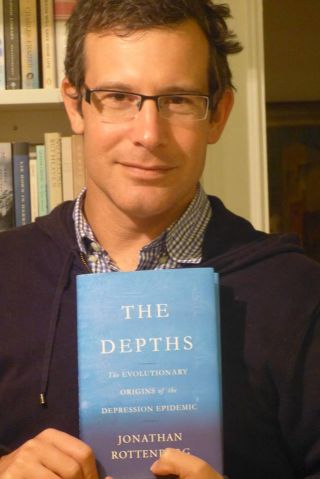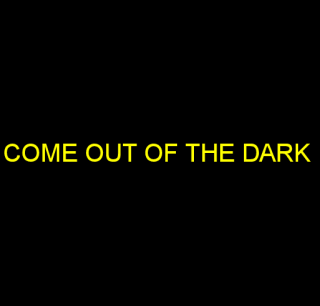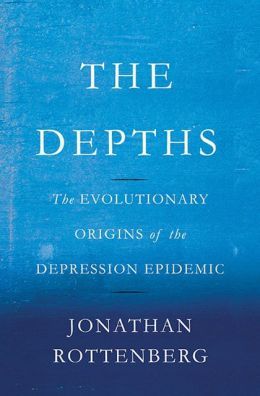Depression
Revolutionary Ideas About the Science of Depression
‘The Depths,’ by Jonathan Rottenberg challenges conventional views on depression
Posted February 2, 2014

Jonathan Rottenberg author of "The Depths."
I had the opportunity to catch up with Jonathan Rottenberg on the phone earlier this week. We talked about his new book, The Depths: The Evolutionary Origins of the Depression Epidemic, as well as, a recent study he published linking childhood depression to early heart disease. Rottenberg is a leading researcher in the area of emotion and psychopathology, where he has focused on major depression.
In The Depths, Rottenberg explains depression in evolutionary terms, showing how its dark pull may arise from adaptations that evolved to help ensure our ancestor's survival. Rottenberg believes that both high and low moods, evolved to drive early homo sapiens to efficiently pursue rewards linked to survival. While this may have worked for our ancestors as hunter-gatherers—in a modern environment in which daily survival is no longer our sole focus—the dark side of the mood spectrum can engulf a person like a black hole and cause someone to slide into severe, long-lasting depression.
As Rottenberg explained in a recent Charting the Depths Psychology Today blog post:
"My new book, The Depths, challenges this conventional approach, which tends to view the legions of the depressed and the formerly depressed as a “broken” people, an ever-afflicted group that will likely need repeated assistance over the life course because of their theorized defects. The biological defect model may have been created with good intentions, but it is both belittling and inaccurate. Depression like any mood state has a biology of course but it is simply not a disease in the same sense that Parkinson’s Disease is. To try to maintain that depression is a brain disease is to cut off a more interesting conversation at the knees.”
As a teenager, I suffered a major suicidal depressive episode and was curious to talk to Dr. Rottenberg about his own struggles with depression and learn more about his hypothesis that we need to stop looking at depressive disorders through the ‘defect’ model and labelling depression as a ‘disease.’
My motivation to write and publish “The Athlete’s Way: Sweat and the Biology of Bliss” was to explore the neuroscience behind how exercise improves mood based on the simple equation that “Sweat = Bliss.” As an athlete and science writer, I believe that the neurobiological benefits of exercise are universally accessible to anyone who breaks a sweat regularly.
Although physical activity is obviously not a panacea for depression... in many cases I believe that a combination of talk therapy, physical activity, and social connectivity can create an upward spiral out of the depths of depression. Running helped turn my life around at age 17 when I suffered a depressive episode. Remaining physically active, socially connected, and healthy helps keep my spirits buoyed every day.
Jonathan Rottenberg is also a long distance runner and is training for the LA marathon next month. On Facebook he says, “If this race (or another like it) is something you'd contemplate doing, don't say it's impossible. 26.2 miles may be a long way but it's just one foot in front of another, much easier than facing down depression.” I couldn’t agree more.
Come Out of the Dark: Creating Sunbeams Within the Blackness of Depression
Rottenberg's book title, The Depths, captures what depression felt like to me as a young adult. The hollowness and despair I felt when I slipped into a major depressive episode as a teenager felt like being sucked into a black hole with such a powerful gravitational pull that I thought the person I was before the depression was gone forever.
In my book, The Athlete’s Way, I talk about my battle with severe depression in a section titled "Darkness within Darkness.” I think the hopeless feeling that joy and light will never enter your body, brain, or mind again is a universal feeling when you are in the depths of depression. On page 141 of The Athlete's Way I write,
“When you are in the blackest of blackness the light seems like it will never enter your brain again. But it will. The light will flicker again. That is the human spirit; it always, always comes back. I’ve been there myself. If you are depressed or suicidal do whatever you have to do to stay vital and get yourself back on track. You were born to be alive. Don’t isolate. Reach out. Ask for help. There will be sunbeams in your soul again. Ride out the storm—but don’t do it alone. People will take care of you. Let them. And make a vow, when you’re back on top, to give something back.”

Rottenberg has started a terrific campaign called “COME OUT OF THE DARK” which aims to destigmatize depression and invigorate a new national dialogue about ways to treat depression. Jonathan Rottenberg describes this campaign in a Psychology Today blog post titled, “The Come Out of The Dark Campaign: An Introduction." According to Rottenberg the “Come out of the Dark” collective has three prime objectives:
• Let’s end society’s ignorance about depression.
• Let’s support depressed people so they get well and stay well.
• Let’s create an environment where people can speak freely about depression and no one feels compelled to conceal their pain.
Depression and Heart Disease
Cardiologists and mental health professionals have established a clear link between depression and heart disease. Heart disease is the leading cause of death in the United States and around the globe. Cardiovascular disease accounts for one in every four deaths in the United States every year.
Jonathan Rottenberg and colleagues released a fascinating study on January 30, 2014 titled, “The Association Between Major Depressive Disorder in Childhood and Risk Factors for Cardiovascular Disease in Adolescence.”
Rottenberg et al found that children with depression are likely to fall into a downward spiral of inactivity, obesity and are more inclined to start smoking at a young age. These factors, along with a lack of social connectivity and the increased stress of being depressed, may account for the link between a major depressive disorder in childhood and a risk of showing signs of cardiovascular disease in adolescence.
It was unclear exactly when the association between clinical depression and cardiac risk develops, or how early in life the association can be detected. That said, these findings suggest improved prevention and treatment of childhood depression could reduce adult cardiovascular disease.
Depressed adults are more likely to suffer a heart attack, and if they do have a heart attack, it’s more likely to be fatal. Just about everything I write for The Athlete’s Way is aimed at improve your mood, quality of life and to prevent you—or someone you love—from dying prematurely of a disease due to lifestyle choices or depression.
Conclusion: How Does Someone Create An Upward Spiral Out of the Depths of Depression?
Jonathan Rottenberg and I agree that taking a multi-pronged approach to treating depression and understanding that moods are a part of everybody's human survival mechanism is an important step for both destigmatizing depression and for creating new treatment options.
Children as young as my 6-year-old daughter’s generation have early signs of depression. The epidemic of anxiety and depression in high schools and on college campuses is overwhelming millions of Americans, their parents, and counseling resources. What can we do to reverse this trend?
Rottenberg explained in a Psychology Today blog post that:
“Our knowledge of how and why people pull out of depression is primitive. But primitive as it is, we can build on two big facts. Fact One: We know from epidemiological research that for most who suffer, depression will improve slowly, with gains uneven, halting, and fragile. And ultimately, about two-thirds of those who partially recover will fall back into an episode of depression. Fact Two is in many ways more curious and interesting. In study after study, it's those who improve early—often about 1/3 of those studied—who retain and often expand upon their gains.”
How does someone who is sliding into the depths of depression reverse the snowball effect and create an upward spiral? Clearly there are no easy answers. But, in his Psychology Today blog post titled “Back From the Black: Why Do Early Improvers Improve?” Jonathan Rottenberg offers a few hunches as to why early improvers from depression improve. One of those hunches is that early improvers “Do the Right Things” as early as possible. Rottenberg says,
“Based on what we know to be helpful in bringing depression to heel, we can surmise that early improvers try to exercise, keep active, and maintain a normal schedule if they can. If they are in treatment, they keep their appointments and comply with the doctor's requests. They try to make full use of their social networks of support rather than immediately withdrawing from them...One possibility is that mood shift picked out the people who were unusually receptive to the pharmacological effect of the drug. But another perhaps more interesting hypothesis is that this shift in positive mood feeds an upward spiral of behavior—a small amount of positive mood allowed patients to begin to do the right things to re-engage with their environment, to seek out rewards again, and to benefit when good things happen.”
To help bring the millions of Americans who struggle with depression out of the depths, we need to do a better job of bringing to light the wisdom and tricks of those who have recovered. Rottenberg argues that instead of waiting for modern medicine to deliver a pharmacological cure for depression—which he believes is unlikely—we should take more active steps to help individuals chart their own recoveries here and now.

The Depths: The Evolutionary Origins of the Depression Epidemic is available for for pre-order on Amazon.com. The official date of publication is February 11, 2014.




